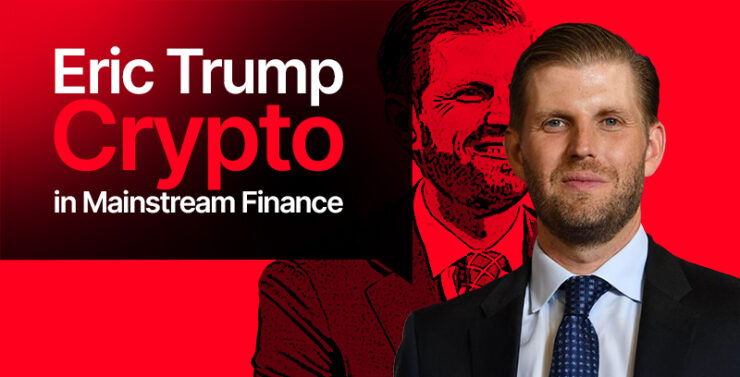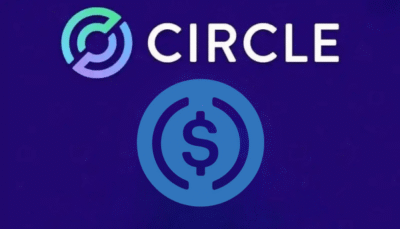Eric Trump wants to make America a crypto tax haven—and his plan is shaking up both Wall Street and the digital asset world. His radical proposal to eliminate capital gains taxes on American cryptocurrency projects could fundamentally reshape the economy, turning the U.S. into what the administration calls the “crypto capital of the world.” If implemented, the policy would offer unprecedented advantages to blockchain ventures while triggering a massive shift toward asset tokenization across real estate, stocks, and bonds.
As Bitcoin surges past $100,000, Eric Trump has emerged as one of the industry’s most powerful advocates, pushing for sweeping reforms that go beyond regulation and straight into tax policy. His zero-tax blueprint is the most aggressive of several cryptocurrency initiatives he’s championing—setting the stage for a high-stakes battle over the future of digital finance in America.
From Real Estate Executive to Crypto Advocate
The 40-year-old son of President Donald Trump has significantly shifted his focus from overseeing the family’s global real estate operations to promoting cryptocurrency adoption. Born January 6, 1984, Eric Trump initially built his career within the Trump Organization’s conventional business empire, but has recently positioned himself as a bridge between traditional finance and the emerging world of digital assets.
His cryptocurrency advocacy gained momentum in 2024, coinciding with his father’s own pivot from skepticism to enthusiasm for digital assets. The elder Trump, who once dismissed Bitcoin as “based on thin air” in 2019, underwent a dramatic conversion after receiving substantial campaign support from cryptocurrency backers, culminating in his July 2024 speech at Nashville’s Bitcoin Conference where he declared his goal of making the United States “the crypto capital of the planet.”
Eric Trump followed this trajectory, becoming a headline speaker at events like Bitcoin MENA 2024 in Abu Dhabi, establishing his cryptocurrency credentials on the international stage. In December 2024, he outlined his vision in a CNBC interview, arguing that “sensible” regulatory guidelines could transform America into a cryptocurrency superpower.
“Nobody knows better than myself and my family how complicated, corrupt and biased today’s banking systems are,” he told the New York Post in September 2024. “The system isn’t working. If it doesn’t work for us then it damn sure isn’t working for folks with a few less zeroes in their accounts. We’ve gotta solve that.”
World Liberty Financial Launch
Eric Trump’s cryptocurrency ambitions took concrete form in September 2024 with the launch of World Liberty Financial (WLF), a decentralized finance platform created alongside his brother Donald Trump Jr. and entrepreneurs Chase Herro and Zak Folkman. The venture aims to revolutionize lending practices by allowing peer-to-peer borrowing and lending without traditional banking intermediaries.
“This is not just bitcoin. It’s about making the financial markets a truly decentralized, truly equitable exchange for the very first time,” Trump explained during the launch. The platform would “democratize banking” through blockchain technology, potentially enabling borrowers to secure loans in minutes rather than months.
The enterprise features a family-wide involvement, with Donald Trump listed as “Chief Crypto Advocate,” Eric and Donald Jr. as “Web3 ambassadors,” and 18-year-old Barron Trump, a freshman at NYU, serving as “DeFi Visionary.” The family maintains significant financial interest, with 20% of the platform’s WLFI tokens allocated to the founding team, including the Trumps, while 63% were made available for public purchase.
Despite website outages during its initial offering, World Liberty Financial generated substantial interest. Token sales reportedly reached $220 million in the first hour, demonstrating significant investor enthusiasm despite criticisms about the project’s structure and lack of transparency.
“This is a chance to cancel those big institutions that tried to cancel us,” Eric Trump told the New York Post. “You don’t have to be a member of my family to know what that feels like. I think we’re all ready for some liberty.”
The Zero Tax Proposal
Eric Trump’s most ambitious cryptocurrency initiative emerged in January 2025 with his proposal for a 0% capital gains tax rate for U.S.-based cryptocurrency projects. The plan would create significant tax advantages for domestic digital assets like Cardano (ADA), Solana (SOL), and Algorand (ALGO), potentially transforming the competitive landscape of the global cryptocurrency market.
The proposal aims to incentivize companies to operate within American borders, potentially boosting the domestic blockchain industry through preferential tax treatment. While non-U.S. projects would potentially face a 30% tax rate, American ventures would enjoy complete capital gains tax exemption, creating powerful incentives for development and investment domestically.
Critics have identified several potential issues with the proposal. Financial analysts note that eliminating capital gains tax on cryptocurrency could trigger a massive loss in tax revenue, as capital gains currently generate approximately 10% of the IRS’s total revenue, primarily from the wealthiest 1% of Americans. The plan could also potentially undermine traditional tax-advantaged retirement structures like IRAs and 401(k)s by eliminating their primary tax benefit.
The proposal’s implementation remains uncertain, as Eric Trump cannot directly set tax policy. Congressional approval would be required for any such tax changes, likely involving extensive negotiations and potential modifications to the original concept.
National Crypto Stockpile Support
Beyond tax reforms, Eric Trump has vocally supported his father’s January 23, 2025 executive order calling for the exploration of a national cryptocurrency stockpile. The initiative would potentially position digital assets alongside gold and petroleum in national strategic reserves, fundamentally altering how the United States views monetary assets.
The strategic reserve concept represents a significant evolution in how governments approach cryptocurrency, potentially legitimizing digital assets through official national adoption. This aligns with the broader Trump administration vision of positioning the United States at the forefront of cryptocurrency innovation and adoption.
While details of the proposed stockpile remain limited, the initiative has generated substantial market reactions. Bitcoin and other major cryptocurrencies experienced significant price increases following the announcement, demonstrating the market-moving power of government cryptocurrency policies.
Regulatory Reform Advocacy
Eric Trump has consistently advocated for reforms to banking and regulatory structures surrounding cryptocurrency. He supports protecting banking services for cryptocurrency companies, addressing what industry proponents describe as regulatory pressure on traditional lenders to avoid serving digital asset firms.
He has endorsed the appointment of crypto-friendly regulators, such as Paul Atkins for SEC chair, to ease regulatory oversight that many in the industry view as excessive. These positions align with his broader vision of creating a more supportive environment for cryptocurrency innovation and integration with traditional finance.
“Banks are sluggish and will almost certainly be replaced by DeFi in the next 25 years,” Eric Trump told the New York Post. This sentiment reflects his belief that decentralized finance represents an inevitable evolution of the financial system rather than a speculative bubble.
Market Impact and Industry Reactions
Eric Trump’s cryptocurrency initiatives have coincided with significant market movements. Bitcoin surpassed $100,000 in December 2024, with Ethereum experiencing a 25% price increase in February 2025, partly attributed to his public endorsements.
World Liberty Financial’s successful token launch demonstrated increased investor interest, with over 3,000 unique wallets participating in the initial offering. This market enthusiasm reflects growing mainstream acceptance of cryptocurrency investments, accelerated by high-profile advocacy.
The impact extends beyond price movements to broader industry perception. Eric Trump’s association with cryptocurrency has helped legitimize digital assets for some investors, particularly those aligned with the administration’s political base. His appearances at major cryptocurrency conferences have reinforced the industry’s growing mainstream appeal.
However, his family’s direct involvement in cryptocurrency ventures has drawn scrutiny, with critics raising concerns about potential conflicts of interest. Some industry observers have questioned whether the Trump family’s cryptocurrency ventures could be used for influence peddling, pointing to incidents such as Justin Sun’s $75 million purchase of World Liberty Financial coins followed by a meeting with Eric Trump at a Middle Eastern crypto conference.
Ethics watchdogs have expressed alarm about the unprecedented situation of a presidential family directly profiting from an industry whose regulatory framework is simultaneously being shaped by presidential appointees. These concerns highlight the complex interplay between political power and financial interests in the rapidly evolving cryptocurrency landscape.
Future Implications and Industry Transformation
Eric Trump’s advocacy potentially heralds a fundamental transformation of America’s relationship with digital assets. If implemented, his zero capital gains tax proposal could trigger a massive tokenization of traditional assets, with real estate, stocks, and bonds potentially moving to blockchain-based ownership structures to capture tax advantages.
This shift could accelerate what proponents call “Finance 2.0,” potentially replacing traditional financial systems with blockchain-based alternatives operating continuously rather than during limited business hours. The traditional model—where stock markets close on weekends and settlements take days—could face disruption from the instantaneous nature of blockchain transactions.
The proposal could also dramatically alter global financial flows. With preferential tax treatment, the United States could become the premier destination for cryptocurrency development and investment, potentially shifting global financial power toward U.S.-regulated digital asset markets and attracting substantial foreign investment.
Whether Eric Trump’s ambitious vision materializes depends on numerous political, regulatory, and market factors. The cryptocurrency industry’s trajectory will be shaped by upcoming congressional decisions, regulatory appointments, and the market’s response to these unprecedented initiatives promising to integrate digital assets into the heart of American finance.





